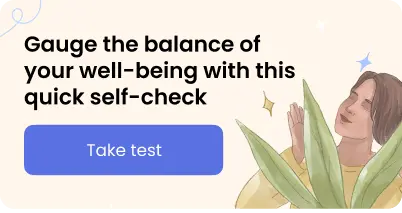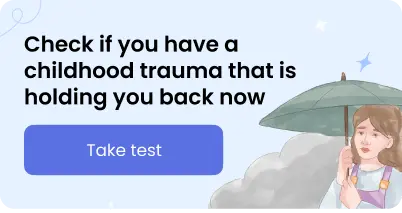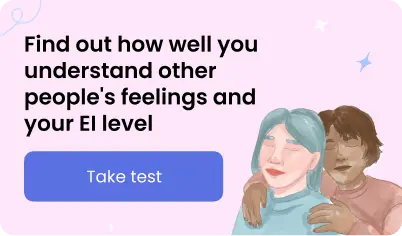Do you feel like all your needs for support, validation, and love must come from relationships instead of from yourself? Do you feel incomplete without your partner’s attention, affection, and maybe even their permission?
This is known as emotional dependency, a state where your emotional well-being heavily depends on your partner’s presence, actions, and feelings.
In this blog post, we’ll explore the concept of emotional dependency, its causes, common signs, and how you can take a self-assessment test to evaluate your emotional state.
By understanding these aspects, you’ll be better equipped to recognize and address emotional dependency in your life.
Emotional dependency quick test
Are you wondering if you might be emotionally dependent on your partner? Take this simple self-assessment to find out. Remember, this is a starting point for self-awareness, not a definitive diagnosis.
Self-assessment questions:
- Do I frequently seek out my partner’s approval before making decisions?
- Do I feel anxious or uneasy when my partner spends time with others?
- Am I constantly worried about the stability of my relationship?
- Do I feel incomplete or worthless without my partner’s presence?
- Do I rely on my partner to make decisions for me all of the time?
- Do I depend on others to make me happy because I can’t make myself happy or be alone?
What are the results? Answering “yes” to most of the questions above may indicate a higher likelihood of emotional dependency in your relationship.
Use these insights to reflect on your relationship dynamics and consider seeking professional guidance if needed.
5 signs of emotional dependency
To better understand if you’re emotionally dependent on your partner, here are five key signs to watch out for.
- Constant Need for Reassurance
One of the most apparent signs of emotional dependency is the constant need for reassurance. If you find yourself frequently seeking validation from your partner, frequently asking if they love you, or needing their approval for everyday decisions, it might indicate dependency issues.
- Fear of Being Alone
Another sign that you may be too emotionally dependent on your partner is a profound fear of being alone. Emotionally dependent people may feel anxious or uncomfortable when their partner isn’t around because they don’t know how to be happy while alone. They may struggle with feelings of abandonment and loneliness, even if the separation is temporary.
- Sacrificing Personal Interests
Emotionally dependent partners also tend to sacrifice their interests and hobbies to please their partner. They may abandon activities they once enjoyed to spend more time with their partner, hoping to gain approval, acceptance, and affection.
- Excessive Jealousy
Your partner’s friendships and interactions with other people might make you feel threatened. Feeling excessively jealous of your partner’s interactions with others can be a sign of emotional dependency, too.
- Difficulty Making Decisions
Moreover, you may frequently seek your partner’s approval before making decisions, whether big or small. Making choices without your partner’s help or approval can be another sign of emotional dependence.
What is emotional dependency?
Healthy dependency, known as interdependency, is a relationship dynamic where there is a balance between independence and mutual support. Actually, most romantic partners are dependent on each other. It’s completely okay; that is why we form relationships: to create intimacy, feel connected and understood, and mutually rely on one another.
If you feel empty inside without consistent contact with your partner though, this is where things get tricky. You need your partner to take care of all your emotional needs, be your only friend, or even act like your parents, these are warning signs.
Imagine a scenario where your mood and sense of worth fluctuate based on whether or not your partner is attentive to you consistently and throughout the day, every day.
For instance, if they don’t text back immediately, you may start feeling anxious or unworthy, seeking the answer, “Why does my boyfriend hate me?” and begin to question your value and whether your partner wants to be with you.
Emotional dependency works much the same way. It’s a state where you rely excessively on your partner for emotional support, validation, and happiness. More than on your own abilities to have those needs met in other ways.
While it’s natural to seek comfort in your partner, emotional dependency crosses the line into needing them constantly to feel whole.
The most basic definition of emotional dependency is relying entirely on someone else to help you deal with your emotions and meet your emotional needs.
This can manifest in an overwhelming need for approval, constant reassurance, and an inability to feel secure or happy without the partner’s presence.
Unlike healthy relationships, where both partners maintain their emotional independence, emotional dependency creates an imbalanced dynamic, where one person seeks out the other to be their “everything.”
Is it love or emotional dependency?
While it’s natural to seek comfort from loved ones, emotional dependency goes beyond the usual support and affection found in healthy relationships. Let’s break down the key differences between love and emotional dependency.
One of the most significant differences between love and emotional dependency is the level of independence in the relationship. In a loving relationship, both partners can maintain their individuality and personal interests.
In contrast, emotional dependency can lead to codependency, where one’s identity is tied to the relationship. A person does not know who they are or what they want to separate from their partner.
Also, love is what involves setting and respecting boundaries to make sure both partners feel comfortable and secure. Emotional dependency, however, tends to ignore these boundaries, leading to feeling trapped and angry.

What causes emotional dependency?
So, what might be at the root of falling into emotional dependency in relationships?
1. Our Upbringing and Past Traumas
Your upbringing and past experiences shape your emotional landscape. If you grew up in an environment where emotional support was lacking or inconsistent, or if you have been emotionally neglected, there is a risk you might develop dependency patterns in relationships as an adult. This can be a way of filling that emotional void left by your caregivers and answering, “Why do I feel so empty?”
2. Low Self-Esteem
Some people who have low self-esteem are more prone to emotional dependency, because they are willing to accept even small and unhealthy moments of connection and validation.
This triggers a tendency to overly connect with the first person to offer any sign of reassurance and see that person as a perfect fit when they may not be, which can lead to unhealthy bonds and an acceptance of unhealthy relationships.
3. Fear of Abandonment
A lingering fear of abandonment can also lead to emotional dependency. If you’ve experienced past relationships where you were left behind, you might cling harder to your current partner to avoid experiencing that pain again.
4. A Lack of Emotional Permanence
Another reason for emotional dependence is emotional impermanence. Emotional permanence is the idea that feelings and relationships can last over time, even if you are not with them or can not feel them all the time.
A lack of emotional permanence can make it hard for people to trust that their partner’s love and devotion will last if they don’t receive constant validation and reassurance. This doubt drives a reliance on constant validation and reassurance, reinforcing emotional dependency. The cycle perpetuates itself, leading to heightened anxiety and insecurity.
5. Attachment Styles and Their Role
Attachment theory helps a lot in understanding emotional dependency. People with an anxious attachment style are more prone to becoming emotionally dependent.
As an example, they are afraid of being left alone and are always looking for reassurance from their partners. In contrast, those with a secure attachment style are less likely to exhibit dependency behaviors because they can meet their own needs alone.
6. Previous Relationship Trauma
As you might know, past relationships can leave scars. If you’ve experienced abandonment or betrayal, you might cling to your current partner out of fear. It’s like emotional baggage you never unpacked.
How to overcome emotional dependency
So, if the results of the self-test above have you asking yourself, “How might I be less dependent on my partner,” here are some tips:
- Self-awareness: The first step to change is recognizing a problem. Reflect on your behavior and identify patterns of dependency issues.
- Set Boundaries: Boundaries are essential for any healthy relationship. They help you maintain your individuality while being part of a couple. Discuss your needs and limits with your partner openly.
- Spend Time Apart: Personal space is crucial. Make time for your friends, hobbies, and interests. Absence makes the heart grow fonder, and it gives you both a chance to miss each other.
- Seeking Professional Help: Sometimes, you need a little extra help, and that’s okay. Therapists can provide valuable insights and coping strategies.
Breaking free from emotional dependency is a journey, not a destination. Take the first step today—reflect on your habits, set boundaries, and invest in self-care. You’re not just doing this for your relationship; you’re doing it for yourself.
Additionally, take quick tests from Breeze and discover a stronger, more independent version of yourself.
Emotional dependency comes from an attempt to fill a void, to fill an emotional need, and to define ourselves through our relationships with others. If you want to overcome emotional dependency, noticing the patterns within yourself is a crucial first step. Notice your driving thoughts, expectations, needs, and fears, and then how you respond to those various pieces. So much of the work is learning to shift that focus from other people back onto yourself. Healing what needs to be healed, rediscovering who you are as an individual, and learning through the process that you are capable of healing and meeting your own needs.











